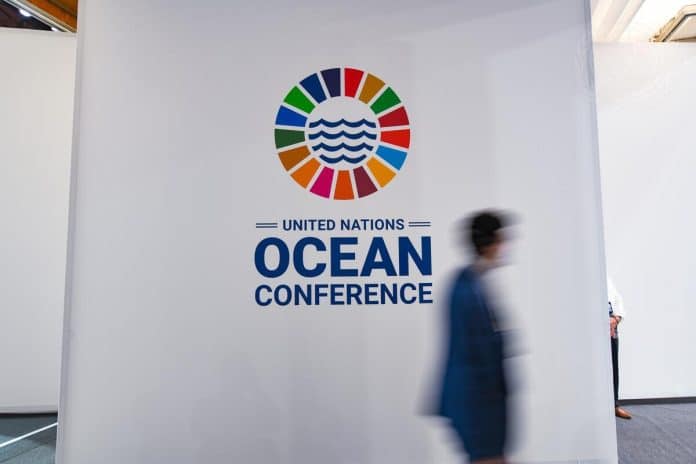With climate change, biodiversity loss and pollution exacting a devastating toll on the world’s ocean — critical to food security, economic growth and the environment — the 2022 UN Ocean Conference opened in Lisbon, Portugal on Monday with a call for a new chapter of ocean action driven by science, technology and innovation.
“Sadly, we have taken the ocean for granted, and today we face what I would call an “Ocean Emergency,” United Nations Secretary-General António Guterres told delegates at the opening of the Conference. “We must turn the tide. A healthy and productive ocean is vital to our shared future.”
The UN Secretary-General also stated that there is good news with a legally binding instrument on the conservation and sustainable use of marine biological diversity for areas beyond national jurisdiction; a new treaty that is being negotiated to address the global plastics crisis that is choking our oceans; and a week ago multilateral action on display with a World Trade Organization agreement on ending harmful fishery subsidies. But he also noted much more needs to be done.
 Oceans are central to balance of power
Oceans are central to balance of power
“Oceans are central in geopolitical balance of power,” said President of Portugal, Marcelo Rebelo de Sousa in opening remarks. “Health care, economic resources, energy, mobility, migrations, scientific and technological development, climate change, all of this is present either in the context or in the outcome of a pandemic, of war and of crisis.”
More than 20 Heads of State and Government together with thousands of young people, business leaders, scientists and civil society representatives, have presented fresh, bold and innovative solutions to ignite transformational change to effectively address the challenges the ocean is facing.
European countries took an active part in the general debate.
Here are some highlights:
- The EUROPEAN COMMISSION announced 50 voluntary contributions worth EUR 7 billion, including EUR 1 billion to protect high seas biodiversity.
- GREECE announced a partnership with the US to host the ninth Our Ocean Conference in 2024.
- ITALY called on others to join the Blue Leaders initiative, sharing the launch of a restoration programme with EUR 400 million.
- PORTUGAL spoke about developments in ocean sustainability, such as ensuring that 100% of maritime areas under Portugal’s jurisdiction will be environmentally sound, recognizing the link between science and the ocean, and developing a bioeconomy strategy.
- SPAIN underscored the value of sustainable fishing,
- LUXEMBOURG announced a recently launched Blue Natural Capital Fund Facility for blue economy investments.
- MALTA announced that they would prioritize the climate-ocean-security nexus at the UN Security Council.
- BELGIUM expressed optimism to turn the tide on ocean degradation by achieving the 30 x 30 target related to protected areas. Along with SOUTH AFRICA, the FEDERATED STATES OF MICRONESIA and others, BELGIUM is finalizing negotiations on the agreement for the conservation and sustainable use of marine biodiversity in areas beyond national jurisdiction (BBNJ).
- ICELAND highlighted the value of oceans and marine resources in bringing solutions to current crises and feeding the population. Iceland announced that they have joined the high ambition coalition on BBNJ.
- GERMANY highlighted the G7 Ocean Deal which prioritizes, among others, the conclusion of the BBNJ negotiations and stringent environmental management plans and standards under the ISA.
- The NETHERLANDS outlined the 2020 North Sea Agreement as part of its sustainable blue economy ambitions.
- IRELAND shared commitments, inter alia,to expand marine protected areas to reach 30% and obtain 5gW of offshore renewable energy by 2030; and pledge EUR 10 million for international ocean action to support a research partnership with SIDS.
- The UK highlighted commitments to double climate finance to GBP 11.6 billion, spending a third on nature-based solutions with GBP 500 million invested in the Blue Planet Fund; and invest GBP 154 million into the new coast programme helping vulnerable communities adapt to climate change.
Oceans: Key driver for sustainable Development
The theme of the Conference, “Scaling up ocean action based on science and innovation for the implementation of Goal 14: stocktaking, partnerships and solutions,” in line with the UN Decade of Ocean Science for Sustainable Development, stresses the critical need for scientific knowledge and marine technology to build ocean resilience.

The ocean is a key driver for sustainable development In line with Sustainable Development Goal 14. Human health, strong economic growth and a stable climate depend on a healthy ocean.
The ocean is a vital buffer against climate change, absorbing about 25% of all carbon dioxide emissions. More than 3.5 billion people depend on the ocean for their food security, while approximately 120 million people work directly in fisheries and aquaculture-related activities. The majority of these workers live in developing countries, specifically Small-Island Developing States and Least Developed Countries.


 Oceans are central to balance of power
Oceans are central to balance of power